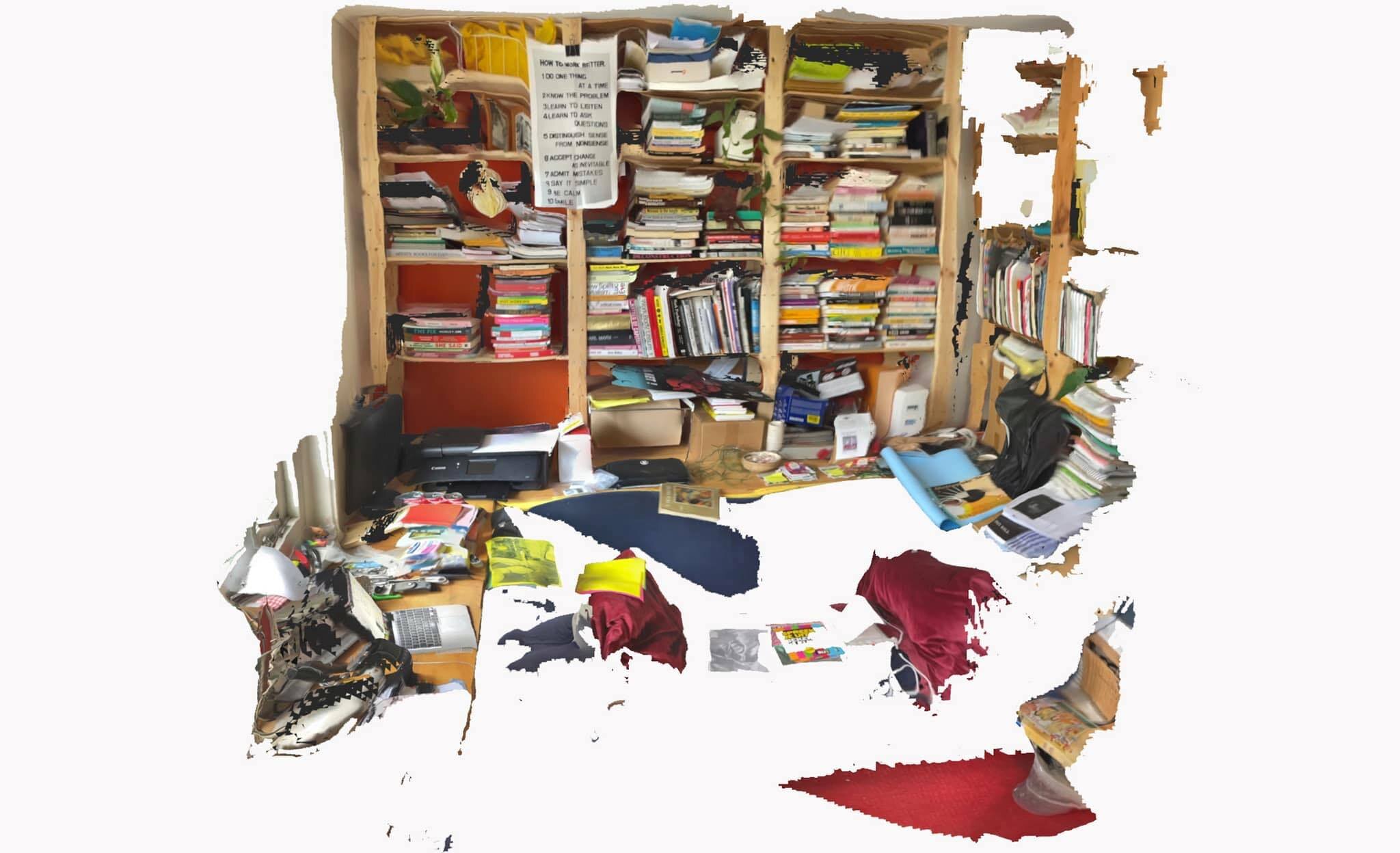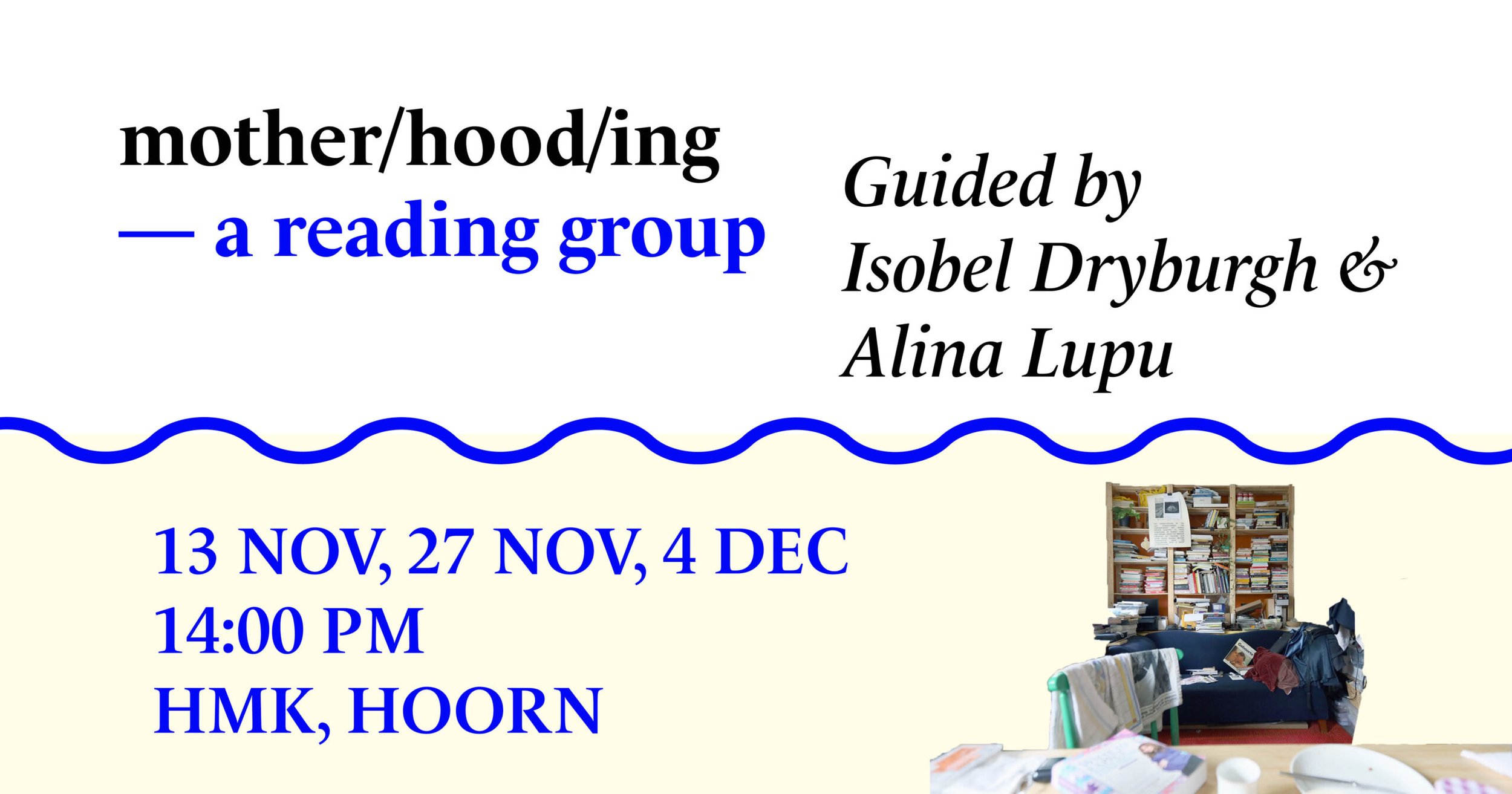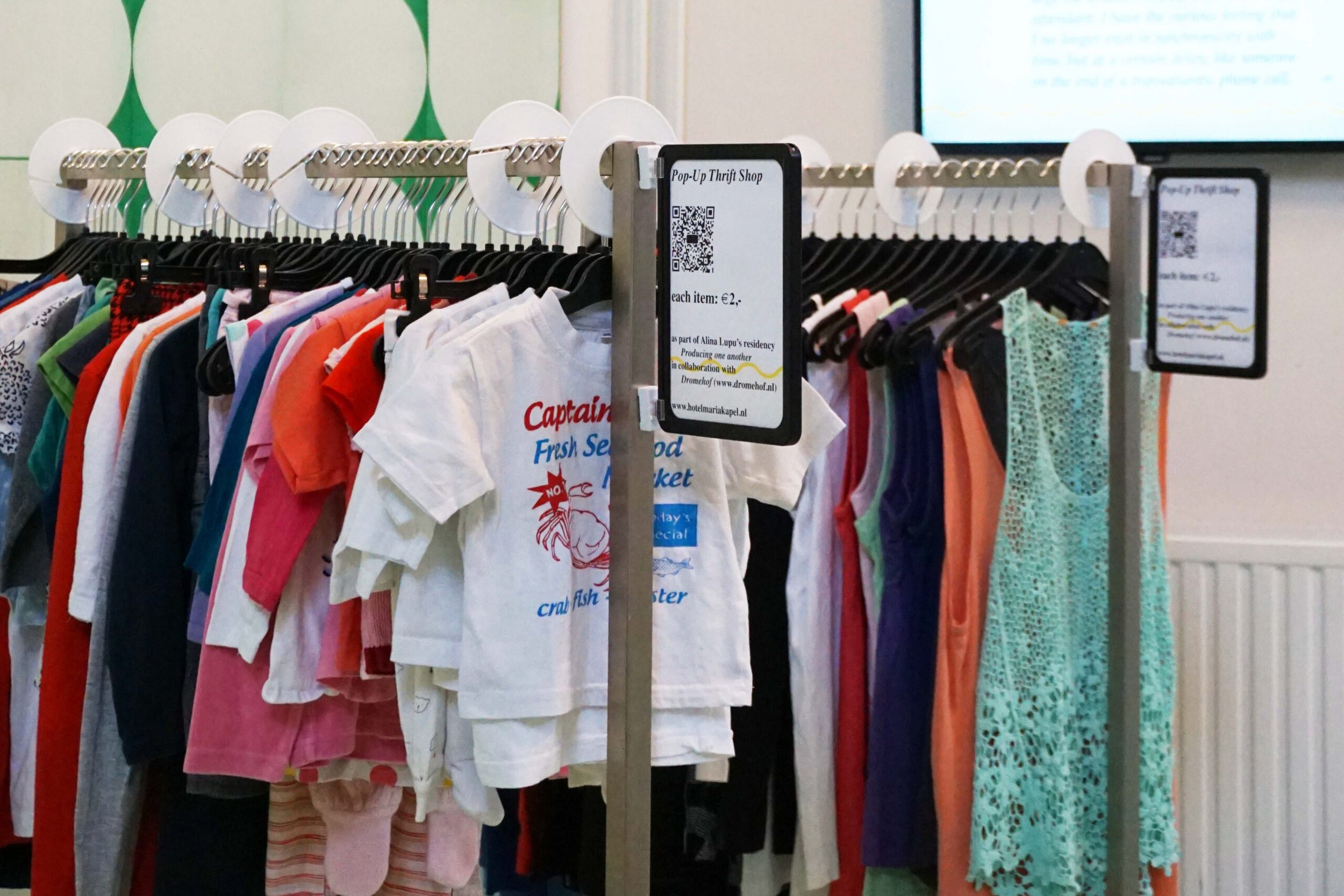
Project: Producing One Another
Artist: Alina Lupu
Residency: July - December 2021
Art (Actuality) / History School: 22 July 2021
Mother-hooding reading group: Saturday, 13 November, 27 November, 4 December 2021
Pop-up thrift shop: 13 November – 18 December 2021
Mother-hood-ing Library: 14 January 2022
Alina Lupu has lived in the Netherlands since 2012, when she left Romania to train and work as an artist here. Since then, her time with her family has been limited to the few trips she makes to her home country or when her family comes to visit her, never more than one or two weeks at a time. For her residency, Lupu will invite her mother to stay with her at HMK and use the time in Hoorn to build, solidify and continue the band - a dialogue that started at the time of her birth and continues now. outside the framework of traditional productivity.
Background
“In the beginning of this year both me and my mother started engaging with new forms of non-working – I, through having lost the employment that maintains my work as an artist, and my mother due to the change in her employment status; early retirement. Neither of us ever stopped our reproductive labor, not for ourselves or for each other, even though we are now apart and no longer share the relationship of dependency we did in my early life. I have not been her provider of shelter, but she was mine.”
Alina Lupu seized the opportunity of HMK's residency format to explore her relationship with her mother. In the month of July, 9 years after Alina's move to the Netherlands, she temporarily uprooted her mother from Romania for a stay in Hoorn, to continue the dialogue that started with her birth.
She did this to allow them both to get to know each other again and in new ways, taking the advantage of nearly a decade that has passed since her departure and the 2,500 km that had to be traveled to meet. During their residency at HMK, they will reflect on the ancient ways that made them who they are as individuals and in relation to each other: from traditional forms of employment to lifelong frames of reference, to national identity and the many emotional hurdles mothers and daughters face on their way to produce each other.

Mother/hood/ing – reading group
Saturday, 13 November, 27 November, 4 December 2021
On the occasion of Producing one another, Alina Lupu, together with Isobel Dryburgh, is organising a reading group on the topic of motherhood to run alongside the residency, and to bring it to its completion.
The Mother/hood/ing reading group is born out of a wish to continue reflecting on the topic which Alina’s residency Producing one another initiated. During the reading groups, Alina, together with Isobel and the participants, will dive into personal, historically relevant, and fictional texts that relate to the many meanings of being a mother, of mothering, and motherhood. Perhaps it’s good to know we are also considering mother/hood/ing beyond its traditional gender confine.
The ultimate idea is to create, within Hotel Maria Kapel, a living and ever-expanding Motherhood Library, starting off with the texts being discussed during the reading group. The library itself will be built by Harriet Rose Morley, as a structure by the end of the year, in the same style as the rest of the furniture in use at the institution. Harriet is a multi-disciplinary artist, maker, educator, and facilitator, and a previous artist in residence at HMK.
Important note:
The topic of motherhood is inherently one that touches us all. Whether we are mothers, have a mother, are feeling the absence of a mother, would like to become mothers, can’t become mothers, or think of our partners who are mothers, we move in and out of acknowledging the topic and its significance in our lives.
The Mother/hood/ing reading group is a place to share personal reactions to texts, which inherently stem from your relationship with the topic of motherhood and mothering, but don’t feel obliged to. There is no expectation or necessity to share. Always take into account your level of comfort in interacting and feel free to state your boundaries if the topic feels too close to home.
The visuals for the reading group are made by Ana-Maria Gușu, who is interning with Alina Lupu during the autumn of 2021.
Pop-Up Thrift Shop
13 November – 18 December 2021
As part of her residency Producing One Another, artist Alina Lupu will be installing a pop-up thrift shop in collaboration with charity foundation Dromehof – and alongside the Mother/hood/ing reading groups she is organising together with Isobel Dryburgh.
Artist Alina Lupu rounds off her long-term residency period with the implementation of several embodied pieces of reflection that intervene, renegotiate and feed back into HMK and its activities, thus carefully producing one another. For this installation – a fully up and running Pop-Up Thrift Shop with second hand clothing for every age and gender – Alina reflects on motherhood and mothering, for newborns and for those who have mothered but have since reached old age and need mothering for.
In order to realise the Pop-Up Thrift Shop, Alina partnered up with Dromehof, a charitable foundation with a second hand store in Zwaag, where all proceeds go to organising support material, get-togethers and outings for lonely elderly people. This year, they gathered funds for providing robot cats and dogs for people suffering from dementia, and they opened an activity center next to the shop. With the pop-up at HMK, Alina hopes to distribute some extra money to their cause, and to remind us to look out for the people that cared for us.
For more information: www.dromehof.nl
–
Alina Lupu says: Stichting Dromehof, located not too far from HMK, is a charity that operates a second hand clothing store and is working on helping the elderly with company and engagement. The main motivation behind bringing a piece of Dromehof into HMK as a pop-up thrift shop is social. One of my worries about my mom, while we were in residency together during July, was her loneliness and lack of support in old age. It’s hard to patch a worry of this size for myself, so with this small attempt I’ll try to patch the worry in others. Every item bought in this pop-up shop feeds back into the Dromehof system, to support their cause.
This might be a bit of a detour in trying to understand why a pop-up thrift store in Hotel Maria Kapel, but bear with me here. There’s an amazing scene at the very end of Rachel Cusk’s “A life’s work” which I will quote in full as a reference and which reminded me of what I did while in Hoorn, while in residency with my mother, and also how I hung out with my mother many times, in clothes stores, as some sort of bridge towards changing ourselves and keeping each other company. And here goes:
“I go to London, alone, for the weekend and walk stupidly around Oxford Street in the glare of an urban summer. Everything seems weirdly futuristic, as if I had been deposited there by a time machine. I want to buy clothes, to make up for two years in which I have been as far from fashion as an anthropologist on a long field trip: but the racks of things look incomprehensible and unrelated to me, like costumes for a drama in which I no longer have a part. I lack the desire for myself that would teach me what to choose; I lack the sense of stardom in my own life that would urge me to adorn myself. I am backstage, attendant. I have the curious feeling that I no longer exist in synchronicity with time, but at a certain delay, like someone on the end of a transatlantic phone call. This, I think, is what it is to be a mother. The most terrible feeling of stress and anxiety begins to mount in me there in the shop. My heart flails in my chest with panic. I long for my child, long for her as for a sort of double, a tiny pilot boat winging young and certain up the channel ahead of me, guiding the blind, clumsy weight of me through. I go to the children’s section of a department store and stand there amidst the cribs and the baby clothes, the teddy bears and the tiny shoes, and I feel alleviated, rescued, plugged into a source of life.
All day I have heard babies crying, faint threads of distress from elsewhere borne past me on the air, and each time I have felt a fine quiver of response, razor-sharp, immediate, and have had to steel myself not to look around. A baby begins to cry there in the children’s department, not six feet from me. It is the raw, tiny cry of someone only a few days old. I look up and see the pram, the mother frantically jiggling it with one hand while raking through racks of baby clothes with the other, her face a fist of concentration. She is debating something in urgent tones with the older woman – her mother – standing next to her. The baby’s cries are fast with barely a beat between them. I know that this means the woman has less than a minute to choose and purchase an outfit, but her mother disagrees with her choice and is remonstrating with her. I can see by the way she moves that her body is still stunned with childbirth. Go home, I think. Go home. Wrap the baby in a tea-towel, she won’t care. Just give in and go home. She doesn’t give in. She has an image of this shopping expedition and she is clinging to it with sharp teeth. She can’t bear something to go unresolved, unfinished, for she fears that nothing will ever be resolved again. She’s trying to keep up, to stay in time, but she’s swimming against a powerful current. I see her steal looks at her mother, brimming with longing and confusion, and hurt. After all these years she has discovered her mother’s secret and it is somehow disappointing, a let-down, for she is in those first days of her parturition both mother and child, and the passionate emotion she feels for her vulnerable self finds no reflection in her own mother’s disapproval, her compassionless urge to dispute. Years of human politics have adhered to her mother’s heart: they hang from it like stalactites, like moss. Her own heart is new, raw, frantically pulsing. Will time turn it, too, unfeeling?
The baby cries and cries; and it is all I can do to not lift it from its pram and hold its small, frightened body close against my chest, hold it and hold it until it stops, so certain am I that it would, that it would know that I knew, and be consoled.”

Art (History) Actuality School: Soft resistance, hard resistance.
Walks, queering, squatting, something to hold on to, and the neoliberal turn.
Thursday, 22 July 2021, 19:30-21:00.
An interactive art history or rather an actuality referencing lecture by the artist in residence Alina Lupu, responding to the exhibition Missing Homes, curated by Danai Giannoglou, with Arie de Fijter, Sarah Naqvi, Paky Vlassopoulou, Shreya de Souza, and Mylou Oord, as organizers of Queer Choir Amsterdam, together with Sarah Naqvi and Setareh Noorani & Matt Plezier (SMET).
Alina’s task will be to freely associate and make links to present-day events wondering where can we currently find proofs of resistance concerning the notion of shelter and institutional frameworks, and how do these proofs of resistance manifest. The works in the exhibition Missing Homes will play the role of starting points, of anchors, which will guide the conversation.
Bio: Alina Lupu
Alina Lupu is a Romanian born and raised post-conceptual artist and writer living in The Netherlands. The focus of her practice is on precarious living and working conditions for artists and workers in general. In September 2020 she joined the program committee of Kunsthuis Syb in Beesterzwaag and she is a recent board member of Platform BK, where she is committed to improving the position of (international) artists and stimulating public debate about the role of visual artists. art in society. During the month of July 2021, Alina will stay with her mother Valy at Hotel Maria Kapel, where they will reflect on the meaning of producing each other.






